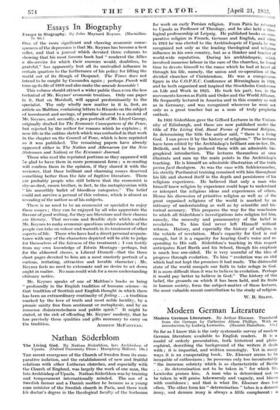Nathan Soderblom
Tim recent emergence of the Church of Sweden from its com- parative isolation, and the establishment of new and fruitful relations with other Lutheran charches, and especially with the Church of England, was largely the work of one man, the late Archbishop of Upsala. Nathan Siiderblom was by training and temperament internationally minded. The son of a Swedish farmer and a Danish mother he became as a young man minister of the Swedish church in Paris, and there took his doctor's degree in the theological faculty of the Sorbonne for work on early Persian religion. From Pkfris he returned to Upsala as Professor of Theology, and he also held a then. logical professorship'at Leipzig. He published books on com- parative religion in French, German and English, and when in 1913 he" was elected to the Archbishopric of Upsala he was recognized not only as the leading theological and religious influence in his own country, but as a thinker and teacher of world-wide reputation. During his archbishopric, which involved immense labour in the care of the churches, he found time to devote himself to the cause which he had at heart all through his life, namely, the union and co-operation of the divided churches of Christendom. He was a conspicuous figure in the C.O.P.E.C. Conference at Birmingham in 1924, and he both organized and inspired the Stockholm Conference on Life and Work in 1925. He took his part; too, in the movements known as Faith and Order and the World Alliance. He frequently lectured in America and in this country as well as in Germany, and was recognized wherever he went net only as a great teacher but as a man of truly prophetic) outlook. - In 1931 Siiderblom gave the Gifford Lectures in the Univer- sity of Edinburgh, and these are now published under the title of The Living God, Basal Forms of Personal Religion. In determining the title the author said, -4` there is a living God. I can prove it by the history of religions." The lectures have been edited by the Archbishop's brilliant son-in-law, Dr. Brilioth, and he has prefaced them with an admirable bio- graphical introduction. The lectures themselves at once illustrate and sum up the main points in the Archbishop's teaching. He is himself an admirable illustration of the truth pectus tacit theologum. As was the case with Schleiermaeher, his strictly Puritanical training remained with him throughout his life and showed itself in the depth and persistence of his religious experience. He "believed that only a man who himself knew religion by experience could hope to understand or interpret the religious ideas and experiences Of others. Hence his discussion of primitive religion as well as of the great organized religions of the world is marked by an intimacy of understanding as well as by scientific and his- torical accuracy. This prepares the way for the conclusion to which all SOderblom's investigations into religion led him, namely, the necessity and paramountcy of the belief in revelation. To him God never left Himself without witness. History, and especially the history of religion, is the vehicle of revelation. Man's capacity for God is real enough, but it is a capacity for hearing God's voice and re- sponding to His call. Stiderblom's teaching in this respect anticipates Karl Barth and his School, though his emphasis is much less one-sided. He is very scornful of the idea of progress through evolution. To him " evolution was an idol which had not kept the promises it had made. The distressful state of the world compels our faith to take refuge in God. It is more difficult than it was to believe in evolution. Perhaps it would pay better to believe in God." The history of this belief, the grounds on which it has been held, and its fruits in human society, form the subject-matter of these lectures, the most valuable recent contribution to the study of religion.
W. B: Smarm.






































 Previous page
Previous page